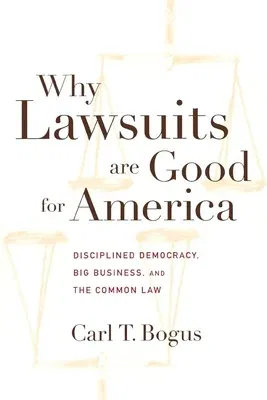Argues that lawsuits work far better than commonly understood
Judging by the frequency with which it makes an appearance in television
news shows and late night stand up routines, the frivolous lawsuit has
become part and parcel of our national culture. A woman sues McDonald's
because she was scalded when she spilled her coffee. Thousands file
lawsuits claiming they were injured by Agent Orange, silicone breast
implants, or Bendectin although scientists report these substances do
not cause the diseases in question. The United States, conventional
wisdom has it, is a hyperlitigious society, propelled by avaricious
lawyers, harebrained judges, and runaway juries. Lawsuits waste money
and time and, moreover, many are simply groundless.
Carl T. Bogus is not so sure. In Why Lawsuits Are Good for America,
Bogus argues that common law works far better than commonly understood.
Indeed, Bogus contends that while the system can and occasionally does
produce "wrong" results, it is very difficult for it to make flatly
irrational decisions. Blending history, theory, empirical data, and
colorful case studies, Bogus explains why the common law, rather than
being outdated, may be more necessary than ever.
As Bogus sees it, the common law is an essential adjunct to governmental
regulation--essential, in part, because it is not as easily manipulated
by big business. Meanwhile, big business has launched an all out war on
the common law. "Tort reform"--measures designed to make more difficult
for individuals to sue corporations--one of the ten proposals in the
Republican Contract With America, and George W. Bush's first major
initiative as Governor of Texas. And much of what we have come to
believe about the system comes from a coordinated propaganda effort by
big business and its allies.
Bogus makes a compelling case for the necessity of safeguarding the
system from current assaults. Why Lawsuits Are Good for America
provides broad historical overviews of the development of American
common law, torts, products liability, as well as fresh and provocative
arguments about the role of the system of "disciplined democracy" in the
twenty-first century.

